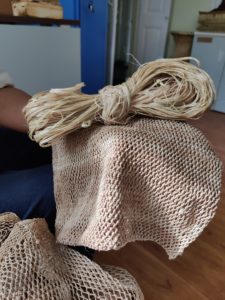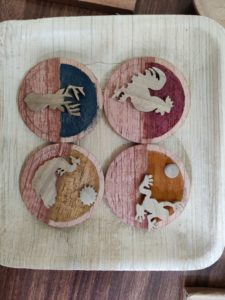By Jayeesha Taneja

Dak_ti, a craft organization founded by Rida Gatphoh, a NIFT, Bangalore graduate, and Peter Marbaniang, an NID student, has nurtured the start-up to bring out traditional art from rural areas of Meghalaya. Every product that comes out of Dakti’s workshops are ‘hand-grown, handpicked and hand crafted’ and in every possible sense, made with love.
The vision of Dak_ti is to empower local artisans and bring their unique style of art through Meghalaya’s abundant natural resources. An excerpt of the interview with Rida Gatpoh:
- How long has the journey of Dak_ti been and whose brainwave was it?
RG: The idea of Dak_ti Craft came about in 2010 when Peter Marbaniang and I travelled to different craft clusters across Meghalaya to conduct design workshops with the local artisans. The abundant skill and natural raw material in the state posed a pressing opportunity- to create handcrafted products using natural materials by sustainable means.
In 2014 we started to exhibit the products at shows and fairs to represent these crafts and artisans from Meghalaya across the country.
By 2015 we catered to stores directly with exclusive range of products under the label Dak_ti Craft in Mumbai, Bangalore, Delhi and Goa. In 2016 we began travelling to these cities with our event; Earthy a Fair- Food, Music, Arts and Crafts from Meghalaya creating a platform for local designers, musicians, chefs and craftsmen to connect with the world outside.
- Can you tell us a bit about your educational background and what all you have branched into?
RG: The founding members are Peter Marbaniang and me, both graduates from NID and

NIFT, respectively; understood the value of our rich heritage and craftsmanship in our state and hence we used design intervention as a means to enhance the craft sector and empower the artisans.
- What’s the story behind Dak_ti?
RG: The name Dak_ti is derived from the Khasi word that can be interpreted as – Impressions of the hand (or) To protect the hand (or) handmade.
In this era of technological advancements and artificial intelligence it is easy to forget and neglect our potential and purpose as humans.
Through Dak_ti as a brand and an enterprise we want to emphasise the importance of being humane.
At Dak_ti we work towards design minimalism, emphasis on recycling, avoidance of waste in production and packaging and creating a geographical identification for the products and practices from
Meghalaya.
- How many artisans across Meghalaya are you working with?
RG: Since we started off by working on reviving the dying crafts and art forms of Meghalaya our engagement with communities was very limited.
Over the years as we branched out into various activities, our reach has spread widely benefitting many more artisans and entrepreneurs either directly or indirectly. It is a meaningful way of identifying the problems and needs to engage with communities through training and facilitation to finally linking them to the market and generating livelihood. Winter Tales is a green festival that we host every year in Shillong to promote local artisanal products.
As curators of ‘The Meghalayan Age – The Store’ in New Delhi we aim to provide a platform and market for every craft and art form of Meghalaya.
- How has the journey been so far and what are the challenges before you?
RG: The journey has been slow, yet steady. When we started off most people thought we were fighting a lost cause.
 Working with the arts and crafts sector requires a lot of patience and in this fast-paced world we live in today one can feel like a misfit and may want to give up. There is also the element of trust to be built while engaging with rural communities and creative communities.
Working with the arts and crafts sector requires a lot of patience and in this fast-paced world we live in today one can feel like a misfit and may want to give up. There is also the element of trust to be built while engaging with rural communities and creative communities.
We have been quite lucky to have a great team and collaborators who have kept the ball rolling. Unfortunately, most of the recognition and support we received has come from outside our state. It has taken us many years of working independently to be noticed and recognised within Meghalaya.
- You are also a singer, musician and songwriter. How do you make the time for all of it?
RG: Music is an integral part of me as my journey after returning from Mumbai to Meghalaya started off with the traditional instrument makers in Wahkhen. Traditional music also happens to be a dying art form and so reviving this practice was the first project it took up. We started an artist collective in 2013 called The Musical Folks and worked on an ecological art project called Musical Nature performing on various cultural platforms across the country.
- What does your typical day look like?
RG: Ever since I left my corporate job, I’ve learned to embrace the organic nature of the days as they unfold. I go with the flow and accommodate as many conversations and engagements as the day allows.
Hence by sharing, propagating and sheltering traditional art in Meghalaya, Dak_ti dedicates its time to the artisans, to help them flourish and bring people together through their shared love for the craft.



